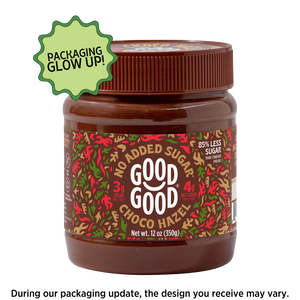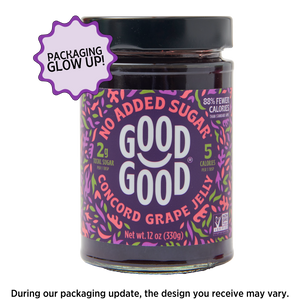Ingredients
Sugar is everywhere, from the sauces you have for dinner, to your morning breakfast cereal and all the sweet treats that we have all come to crave. We have been hardwired to love all forms of sugar. Who can blame us when it comes in the form of sweet jams and sugary doughnuts?
Sugar is highly addictive and lacks nutritional value but you can’t go into a shop without products containing high amounts. As a result, the food industry has increasingly flooded the market with palatable and potentially addictive sugar-sweetened products. And now we consume far more than our bodies require!
At Good Good, we believe you should be able to enjoy the sweeter things in life without all the added consequences. In this article, we will be looking at what sugar is and what the dangers are if you consume too much.

What Is Sugar?
Let’s get to the basics of what exactly sugar is! It occurs in many different forms, and they aren’t all the same.
Sugars referred to as monosaccharides are the simplest of carbohydrates. Glucose, fructose, and galactose are the smallest sugar molecules to be aware of. These constitute most of the carbohydrates we consume daily.
As an example, when glucose and fructose are combined, we get sucrose. This is found in table sugar, corn syrup and honey.
Lactose, the carbohydrate found in milk products, is produced by combining glucose and galactose.
Starch, the carbohydrate found in grains, legumes, potatoes etc. is made by connecting long chain webs of glucose.
Added sugars are mono- and di-saccharides that are added to foods during processing and preparation.
So, nearly three-quarters of the packaged food we lay our hands on contains sugar – including yoghurt, pasta sauce, granola bar, soda, cereal etc.
What Are The Dangers Of Eating Too Much Sugar?
Like most things in life, too much of anything will result in being bad for you. Whilst sugar is neither good or bad, too much can have negative effects on your body and well-being. A sugar-heavy diet can be harmful to our health and lead to health issues. -such as:
No Nutritional Value
Sugary diets may have a negative effect on the nutrition you consume, if you are eating high-sugar foods instead of a balanced diet then you will become lacking in the minerals and vitamins that your body needs to thrive.
Soft drinks, chocolates, pastries, and sugary cereals are examples of foods high in extrinsic sugar. Because of the high sugar content, fat-free manufactured foods are frequently high in calories.
These sugar-laden foods replace whole foods (for example, soda replaces milk and juice consumption in children) and contribute to nutritional deficiencies by providing empty calories.

Tooth Decay
In the 2015 literature review, the WHO discovered that people who consumed more than 10% of their daily calories from added sugars had higher rates of tooth decay. The bacterial acid can attack tooth enamel, resulting in permanent cavities. These bacteria feed on high-sugar diets.
Opt for natural sugar alternatives in your drinks and snacks to get your sugar craving without the risk.
Weight Gain and Obesity
Sugar has the potential to interfere with the hormones that control a person's weight. Leptin is a hormone that signals the brain when a person has eaten enough, however, a high-sugar diet can potentially lead to leptin resistance.
Also, sugar is empty calories, a high-sugar snack and meal won’t leave you satisfied for as long and will lead you to crave and eat more-it is a vicious cycle. This is because it won’t have the appropriate balance of carbohydrates, proteins and fats.
Try to go for well-balanced snacks that taste great but will also promote a healthy diet and lifestyle.
Can Lead To Health Issues
Consuming too much sugar can lead to heart and cardiovascular disease as well as high blood pressure.
A diet with a higher intake of added sugar is linked to risk factors for cardiovascular disease and sugary beverages are associated with elevated blood pressure and a higher incidence of hypertension.
Irritability, Fatigue and Low Energy
Your blood sugar is quickly raised by a high-sugar meal or snack devoid of protein and fat, but as your body tries to process it all, your energy levels plummet, leaving you groggy and agitated.
Large blood sugar and insulin swings can also cause energy levels to plummet, affecting your overall energy level.





![[title] Reforestation Donation by Dollar Donation Club sold by US GOOD GOOD®](http://goodgoodbrand.com/cdn/shop/files/DollarDonationClubShopify_1_300x.jpg?v=1712681952)




